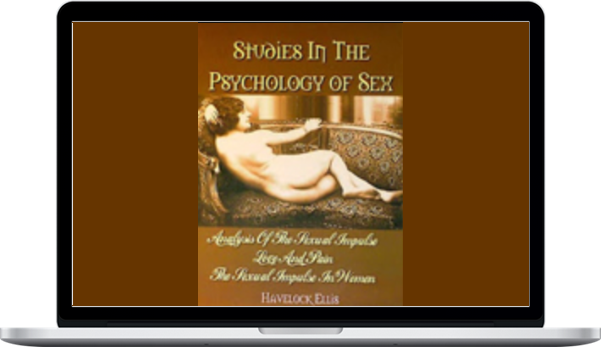Havelock Ellis – Studies in the Psychology of Sex
$31.00 $9.00
Total Sold: 1
» Instant Delivery
Description
Havelock Ellis – Studies in the Psychology of Sex
Havelock Ellis – Studies in the Psychology of Sex, Volumes 1,2,3,4,5. This famous series was originally published in 7 volumes by F. A. Davis Company, medical publishers, and its sale restricted to doctors and lawyers. The origin of these “Studies in the Psychology of Sex” dates from many years back. As a youth I was faced, as others are, by the problem of sex. Living partly in an Australian city where the ways of life were plainly seen, partly in the solitude of the bush, I was free both to contemplate and to meditate many things.
A resolve slowly grew up within me: one main part of my life-work should be to make clear the problems of sex. That was more than twenty years ago. Since then I can honestly say that in all that I have done that resolve has never been very far from my thoughts. I have always been slowly working up to this central problem and in a book published some three years ago – Man and Woman: a “Study of Human Secondary Sexual Characters” – I put forward what was, in my own eyes, an introduction to the study of the primary questions of sexual psychology.
The first edition of this book was published in 1899, following “Sexual Inversion,” which now forms Volume II. The second edition, issued by the present publishers and substantially identical with the first edition, appeared in the following year. Ten years have elapsed since then and this new edition will be found to reflect the course of that long interval. Not only is the volume greatly enlarged, but nearly every page has been partly rewritten.
Now that I have at length reached the time for beginning to publish my results, these results scarcely seem to me large. As a youth, I had hoped to settle problems for those who came after now I am quietly content if I do little more than state them. For even that, I now think, is much it is at least the half of knowledge. In this particular field the evil of ignorance is magnified by our efforts to suppress that which never can be suppressed, though in the effort of suppression it may become perverted.
I have at least tried to find out what are the facts, among normal people as well as among abnormal people for, while it seems to me that the physician’s training is necessary in order to ascertain the facts, the physician for the most part only obtains the abnormal facts, which alone bring little light. I have tried to get at the facts, and, having got at the facts, to look them simply and squarely in the face. If I cannot perhaps turn the lock myself, I bring the key which can alone in the end rightly open the door: the key of sincerity. That is my one panacea: sincerity. – HAVELOCK ELLIS.
About Havelock Ellis
Havelock Ellis (1859-1939)
English essayist, psychologist, a pioneer in establishing a modern, scientific approach to the study of sex. Ellis’s magnum opus was Studies in the Psychology of Sex (7 vols., 1897-1928). Until 1935 his work was legally available only to the medical profession. Ellis became known as a champion of women’s rights and of sex education, but his autobiography My Life (1939) reveals his marital problems and unhappiness in his own sexual life.
“All advance in social reform, even when it involves surgery, is, and always has been, effected by heroic pioneers who are ready to act, and even, if need be, to become martyrs. They slowly win the world to their side. The law limps behind.” (from Questions of Our Day, 1934)
Henry Havelock Ellis was born in Croydon, Surrey, as the son of Edward Peppen Ellis, a sea captain, and Susannah Mary (Wheatley) Ellis. He was educated at private schools in London. At the age of sixteen he made a voyage to Australia in a ship under his father’s command. He worked there as a teacher in New South Wales, where he underwent an inner transformation.
Later Ellis returned to this experience in the novel Kanga Creek (1922) and his autobiography: “Yet there has never been a moment when the foundation and background of my life have not been marked by the impress they received at Sparke’s Creek.” After four years, he returned to England. Ellis entered St. Thomas’ Hospital, London, where he studied medicine from 1881 to 1889.
However, after qualifying he practiced only for a short time. In 1891, Ellis married the English writer Edith Lees; he was still a virgin. From the beginning, their marriage was unconventional – the wedding breakfast consisted of porridge and at the end of the honeymoon, Ellis went back to his barchelor rooms in Paddington. Edith lived at Fellowship house. Their stormy relationship was the central subject in Ellis’s autobiography, My Life. None of Ellis’s four sisters ever married. “If men and women are to understand each other,” Ellis once said, “to enter into each other’s nature with mutual sympathy, and to become capable of genuine comradeship, the foundation must be laid in youth.”
In 1883 Ellis met the South African writer Olive Schreiner. He did not aswer to her expectations, but they remained close friends until her death in 1920. “We were not what can be technically, or even ordinarily, called lover,” Ellis said later. In On Life and Sex: Essays of Love and Virtue (1921) Ellis referred to Schreiner’s Woman and Labour (1911) and her theory that modern society produces a tendency to parasitism in women: “…they no longer exercise the arts and industries which were theirs in former ages, and so they become economically dependent on men, losing their energies and aptitudes, and becoming like those dull parasitic animals which live as blood-suckers of their host.”
The letters of Schreiner and Ellis were published in 1992. It has been speculated that their relationship was unconsummated. Ellis suffered from impotence until he was about 60. With the help of a devoted lover, he finally cured the problem, and remained sexually active until he was 72. “I am regarded as an authority on sex, a fact which sometimes amused one or two (though not all) of my intimate women friends,” Ellis wrote in his autobiography.
More courses from the same author: Havelock Ellis
Delivery Policy
When will I receive my course?
You will receive a link to download your course immediately or within 1 to 21 days. It depends on the product you buy, so please read the short description of the product carefully before making a purchase.
How is my course delivered?
We share courses through Google Drive, so once your order is complete, you'll receive an invitation to view the course in your email.
To avoid any delay in delivery, please provide a Google mail and enter your email address correctly in the Checkout Page.
In case you submit a wrong email address, please contact us to resend the course to the correct email.
How do I check status of my order?
Please log in to DatingCourse account then go to Order Page. You will find all your orders includes number, date, status and total price.
If the status is Processing: Your course is being uploaded. Please be patient and wait for us to complete your order. If your order has multiple courses and one of them has not been updated with the download link, the status of the order is also Processing.
If the status is Completed: Your course is ready for immediate download. Click "VIEW" to view details and download the course.
Where can I find my course?
Once your order is complete, a link to download the course will automatically be sent to your email.
You can also get the download link by logging into your DatingCourse account then going to Downloads Page.
You may also like:
- See more 2 Girls Teach Sex courses
- See more 60 Years of Challenge courses
- See more Adam Armstrong courses
- See more Adam Gilad courses
- See more Adam Lyons courses
- See more Arash Dibazar courses
- See more Bobby Rio courses
- See more Carlos Xuma courses
- See more David Deangelo courses
- See more David Shade courses
- See more David Snyder courses
- See more David Tian courses
- See more David Wygant courses
- See more Dean Cortez courses
- See more Derek Rake courses
- See more FortWorthPlayboy courses
- See more Gabrielle Moore courses
- See more Helena Nista courses
- See more James Marshall courses
- See more Jason Capital courses
- See more Jean Marie Corda courses
- See more Joe Lampton courses
- See more Jon Sinn courses
- See more Lloyd Lester courses
- See more Love Systems courses
- See more Marisa Peer courses
- See more Matt Cook courses
- See more Matt Granger courses
- See more Nick Krauser courses
- See more Pleasure Mechanics courses
- See more Ross Jeffries courses
- See more Talmadge Harper courses
- See more The Modern Man courses
- See more Tom Torero courses
Related products
Total sold: 4
Total sold: 3
Total sold: 52








